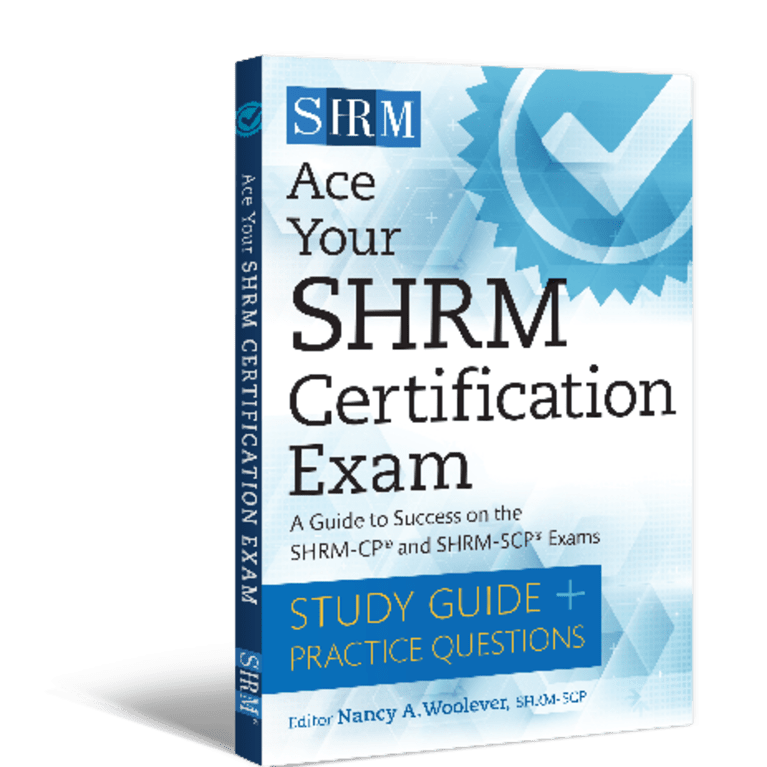
An accessible new guidebook just published by the Society for Human Resource Management (SHRM), Ace Your SHRM Certification Exam: A Guide to Success on the SHRM-CP® and SHRM-SCP® Exams, features expert tips and practice questions that demystify the tests and improve one’s ability to understand and prepare for them. It was edited by SHRM’s vice president of certification operations, Nancy A. Woolever, SHRM-SCP.
The short, easy-to-use volume includes everything a candidate needs to know before taking either level of SHRM certification exam: best practices for studying, research-based advice for sharpening test-taking skills, proven strategies for managing pre-exam anxiety, tips from experts and certified professionals, detailed learning resources, answer keys for both exams, guides to exam structure, terminology and acronyms, plus more.
Below is the first of three excerpts from this helpful publication. Use code ACE19 for an additional 20 percent off when purchased though the SHRMStore. Current SHRM credential-holders who read the book and pass a quiz will earn 3 professional development credits (PDCs) toward recertification.
Excerpt from Ace Your SHRM Certification Exam, Chapter 3
Part 1: Learning How You Learn Best
Part 2: Recognizing the Symptoms of Anxiety
Part 3: What to Expect on Exam Day
We’re not all the same when it comes to learning (and in so many other ways as well!). We receive and process information differently, and we like to learn in different ways. Some people learn best by reading, taking notes by hand, and explaining the concepts to someone else. Others grasp new information and concepts more easily when the content is presented in visual form, via charts, graphs, slides or videos.
Understanding your learning preferences, or styles, will help you decide how best to successfully study for the SHRM-CP and SHRM-SCP exams.
Four Primary Learning Styles
In 1982, management experts Peter Honey and Alan Mumford published a Learning Styles Questionnaire based on psychologist David Kolb’s learning-style model. Honey and Mumford identified four primary types of learners: Activists, Reflectors, Theorists and Pragmatists. No one is entirely one type or another, but most people prefer one or two of the four styles.
Activists (Doers)
You have an open-minded approach to learning and enjoy experimenting, exploring, and discovering. Anxious to practice what you learn and apply it to real-world situations, you might become impatient with lengthy discussions and explanations. Some Activists might have a tendency to be disorganized and to procrastinate.
Reflectors (Reviewers or Observers)
Reflectors prefer to learn by watching or listening. If you’re a Reflector, you like to take your time, collect data, and examine experiences or concepts from a number of different perspectives before coming to conclusions. You might have a tendency to dislike pressure and tight deadlines.
Theorists (Thinkers)
If facts, models, concepts and systems help you engage in the learning process, you might be described as a Theorist. You like to think things through, analyze what you are learning, and understand the underlying theory. You might also tend to be more organized than other types of learners.
Pragmatists (Planners)
You might describe yourself as a Pragmatist if you enjoy solving problems and sometimes become impatient with too much theory and lengthy discussions. When you learn, you want to know how the concepts apply in the “real” world.
Three Ways to Learn
Researchers also have found that our learning styles differ in the ways in which we use our senses to receive and process information. One well-known theory, called “VAK [visual, auditory, kinesthetic],” postulates that most of us learn best when using one or two of our three primary sensory receivers: visual, auditory or kinesthetic.
Visual learners
If you’re a visual learner, you like to have information presented through pictures, charts, diagrams, lists of key learning points, infographics, videos and other visual media. Taking notes and making visual maps helps you remember what you hear or read. Interestingly, some visual learners can visualize pages on which certain information appears.
Auditory learners
You know that you are primarily an auditory learner if you remember more of what you learn when you hear something than when you see it. You might prefer lectures and podcasts to reading. Reading aloud to yourself or talking about what you learn to others can help fix facts and concepts in your mind.
Kinesthetic learners
You can be described as a kinesthetic learner if you find it hard to sit still for long periods. You need to stand up and move around often to keep from losing your concentration. Keeping study periods short and focused, taking notes by hand, and building frequent breaks into your study schedule can help you learn.
Additional Online Resources
Matt Davis is manager of book publishing at SHRM.
For more information on SHRM Certification, and to register for the exam, please visit our website. Already SHRM-certified? Be sure to maintain your credential by recertifying. Learn more about recertification activities here.
//
//(function(d, s, id){ // var js, fjs = d.getElementsByTagName(s)[0]; // if (d.getElementById(id)) {return;} // js = d.createElement(s); js.id = id; // js.src = “http://connect.facebook.net/en_US/sdk.js”; // fjs.parentNode.insertBefore(js, fjs); //}(document, ‘script’, 'facebook-jssdk’)); function shrm_encodeURI(s) { return encodeURIComponent(s); } function RightsLinkPopUp() { var url = “https://s100.copyright.com/AppDispatchServlet”; var location = url + “?publisherName=” + shrm_encodeURI(“shrm”) + “&publication=” + shrm_encodeURI(“Legal_Issues”) + “&title=” + shrm_encodeURI(“Justices Hear ERISA Reimbursement Case”) + “&publicationDate=” + shrm_encodeURI(“11/11/2015 12:00:00 AM”) + “&contentID=” + shrm_encodeURI(“6badda72-62e7-49e8-b4bd-ebbd02a72a17”) + “&charCnt=” + shrm_encodeURI(“7399”) + “&orderBeanReset=” + shrm_encodeURI(“True”); window.open(location, “RightsLink”, “location=no,toolbar=no,directories=no,status=no,menubar=no,scrollbars=yes,resizable=yes,width=650,height=550”); }
Source link
The post Ace Your SHRM Certification Exam appeared first on consultant pro.
via Tumblr Ace Your SHRM Certification Exam
Ace Your SHRM Certification Exam syndicated from http://theconsultantpro.com/

No comments:
Post a Comment